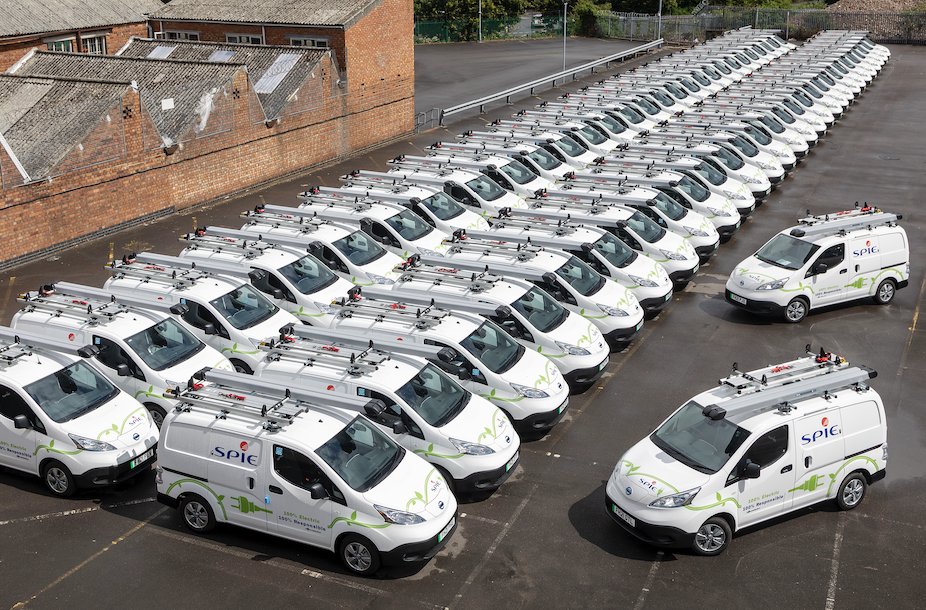SPIE UK takes on 60 electric vans as part of its future fleet strategy

The move is part of SPIE’s commitment across its business to reduce its impact on the environment, in line with its yearly Integrated Annual Report. With the adoption of alternative fuel vehicles across its fleet, SPIE UK has calculated that it should reduce its emissions by approximately 20 percent in the next twelve months, and is estimating an 80 percent reduction by 2025.
The first vehicles to hit the road under the future fleet strategy will be 60 Nissan e-NV200 vans. SPIE has chosen the e-NV200 because it aligned with its operational requirements. Alongside the zero tailpipe emissions, the e-NV200 also delivers low operating costs, high efficiency and high-end levels of performance. The award-winning vehicles are powered by the same 40kWh battery as the Nissan LEAF, providing an operational range of 187 miles together with a maximum cargo capacity of over 700kgs and four cubic metres plus vehicle-to-grid charging technology. Moreover, the vehicles will be fitted with a range of technology features to improve the safety, performance and ease of use of the vehicles. These features include autonomous braking, driver and passenger airbags, vehicle telemetry, 60 Mph speed limiter, front and rear facing safety camera technology plus parking assistance sensors and cameras. Additionally, to help drivers and reduce “range anxiety”, the vehicles feature satellite navigation with live traffic displays and directions to nearby charging points.
As part of the future fleet strategy, SPIE UK wanted to make sure that the rollout of the new electric vehicles would not make working life more difficult for their employees. As well as choosing the most appropriate vehicles, a mobility survey was launched to understand the specific needs of the workforce and how the vehicles would be used. With the vehicles being parked at employee’s homes, charging and renumerating employees for the associated costs was identified as a key issue. In line with this, SPIE UK has partnered with Shell Fleet Solutions and NewMotion – a member of the Shell Group - to install a complete home charging solution for users of the new vehicles. As part of the solution, the smart charge points will monitor the amount of electricity being used to charge the electric vehicles (EVs). SPIE employees will be reimbursed accordingly for the costs of the EV charging. This approach avoids the pay and reclaim model typically used for electric vehicle fleets, ensuring that SPIE employees will not have to bear the cost of operating the vehicles themselves at any point. As a result, SPIE UK’s strategy for transitioning to a sustainable fleet is designed to slot into their employees lives without being a hindrance. Additionally, SPIE employees can also charge on-the-go with the Shell Card, providing access to almost 8000 charge points across the UK. The Shell Card also enables the consolidation of home and on-the-go charging into one invoice, contributing to an easier transition to EV for SPIE.
According to Keith Atkins, Head of Fleet, SPIE UK, “The introduction of these electric vehicles is the latest step in the SPIE UK future fleet strategy and is another step that SPIE UK is taking in its transition to meet its climate goals. Throughout the process, we have ensured that not only will the rollout of alternative fuel vehicles work for our business but also our employees. Working with them to understand how we can make this change a sustainable part of their lives, as well as being a sustainable change for the planet, was incredibly important to us. We believe that the steps that we have put in place will ensure that SPIE UK will successfully play its part in a low carbon future, and we look forward to working with our partners to achieve this.”
“We are really proud of our partnership with SPIE and wholeheartedly support their efforts to decarbonise. They are, of course, doing incredibly important work to encourage and assist others to follow suit,” said Andrea Patti, Head of Corporate Sales UK, Nissan. Patti continues, “We applaud proactive organisations who are leading in this space and are very thankful to SPIE for choosing our brand. We send them every good wish and look forward to maintaining the relationship as they continue to introduce electric vehicles to their fleet.”
Tim Laver, Managing Director, ALD Automotive, said, “As we edge ever closer to the Government’s 2030 deadline, which will end the sale of new petrol and diesel vehicles, fleets need to consider how they will transition away from internal combustion engine (ICE) vehicles over the next two or three renewal cycles. ALD Automotive has been SPIE’s fleet partner since 2014, and during this time we have worked with their team to begin decarbonising their fleet, taking it from 100% ICE vehicles, to a mix of ICE and plug-in hybrids. As SPIE embarks on its new fleet strategy, we’re committed to helping them transition to a zero-emission fleet and excited to support them on this journey.”
“TGS were appointed as SPIE’s ‘Vehicle Conversion Partner’ and are very pleased to have had the opportunity to play a vital part in the Implementation of their Future Fleet Strategy” said Glenn Smith, Director of TGS. “Our dedicated EV consulting team have worked with SPIE to design conversions that are both suited to electric vehicles and provide efficient, safe working environments for SPIE’s operatives. The racking system TGS supplied is specifically designed to suit electric vehicles, is lightweight and includes a unique crash tested floating floor. TGS are fully committed to supporting the UK’s major fleets as they transition to alternative fuel vehicles and have invested in dedicated EV conversion bays, fully trained staff and charging infrastructure, allowing us to convert large numbers of EV vehicles. Our new 100,000 square foot fitting centre includes a dedicated vehicle handover and training area and secure storage compounds for hundreds of vehicles.”



